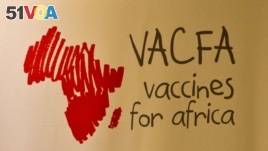March 20,2013
Researchers said that despite progress immunizing African children against disease, vaccination efforts are falling far short of what’s needed. They warn that vaccine supply and cost need urgent attention.
University of Cape Town researchers say there are “failures within the immunization system.”
“Well, there’s a very wide range if you look at African countries in terms of performance of immunization programs. Some are doing very well and others are doing very badly. So this disparity is a very big concern,” said Shingai Machingaidze, associate researcher at the university’s Vaccines for Africa Initiative.

The Vaccines for Africa Initiative is based at the University of Cape Town.
Similar problems exist in developing countries outside Africa, as well.
“For the countries that are not doing so well in terms of their vaccine coverage it means that large numbers of children do not get basic vaccinations before they reach one year. 1.5 million vaccine preventable disease deaths were recorded in 2010,” she said.
Professor Gregory Hussey, director of the Vaccines for Africa Initiative, said that polio, which had been on the verge of eradication, remains entrenched in some places.

University of Cape Town Professor Gregory Hussey speaking at the first International African Vaccinology Conference, November 2012
The World Health Organization had said after polio immunization was disrupted in northern Nigeria several years ago, that particular strain of the virus spread all the way to Ethiopia.
Continued outbreaks of measles, Hussey said, are another example of immunization system failure.
“With our porous borders in Africa disease can spread from one place to another place, especially if children are not being immunized properly,” he said.
Hussey said that while various U.N. and international agencies have campaigns advocating immunization, Africa lacked a home-grown program to do so.
“We started this Vaccines for Africa Initiative precisely to try to make people more aware of issues around vaccine and immunization practices. And this includes not only the individuals who are delivering the vaccines, the healthcare workers, but also the policymakers, as well as communities, who should be receiving the vaccines,” he said.
A major obstacle to effective immunization is the cost of vaccines. For example, more countries are starting to introduce vaccines against pneumonia and diarrheal disease – two of the leading killers of young children.
Hussey said, “You’re looking at pushing up the price from a few dollars up to about $58. And that’s way beyond the per capita health expenditure of most countries in Africa, which probably is around about $10 to $20 per person.”
An international public-private partnership, the GAVI Alliance, plays a major role in helping developing countries introduce vaccines. GAVI negotiates with pharmaceutical companies to lower the cost of a vaccine dose. But Hussey warned that cheaper prices for vaccines won’t last forever.
“Once they sort of graduate from GAVI they still will have to purchase those vaccines. So there are a number of countries that are going to graduate in the next year or two and that’s a problem for them," he said. "Because how to they then fund the supply of those vaccines?”
He said that some countries that can afford the vaccines on their own have not made child health a priority.
The University of Cape Town researchers say, “African leaders must be held accountable for meeting agreed country immunization targets and honoring international commitments.”
Last November, the first International African Vaccinology Conference was held in Cape Town, South Africa where participants adopted the Cape Town Declaration. Among other things it called for strengthening childhood immunization programs; encouraging regional co-operation; strengthening purchasing power by pooling resources and ensuring African governments commit to saving children's lives.